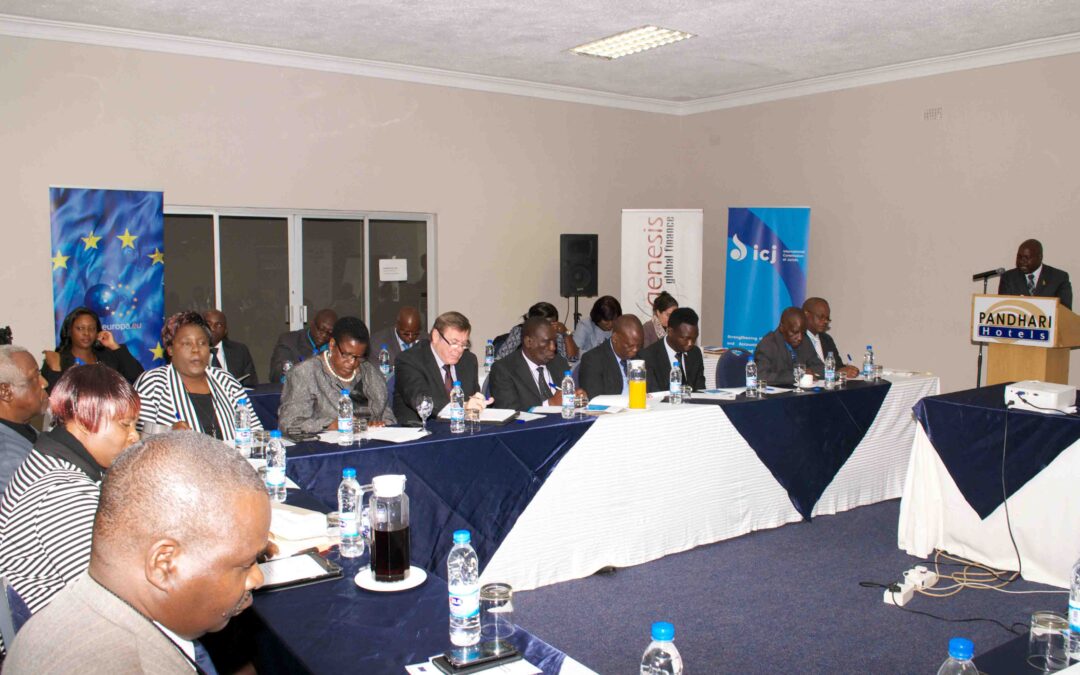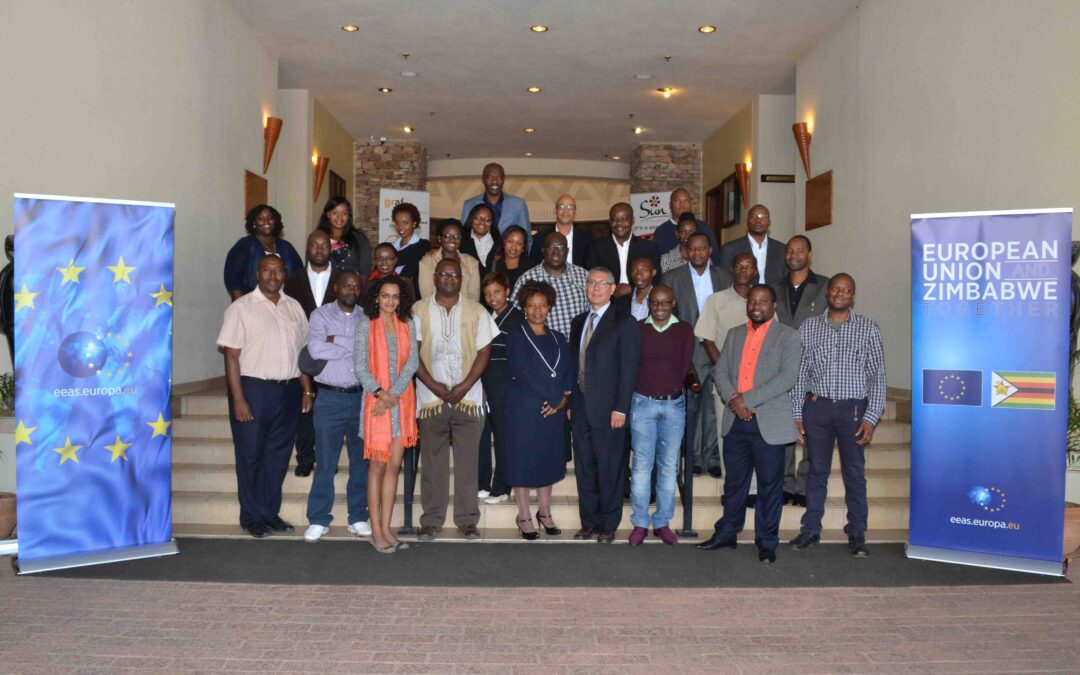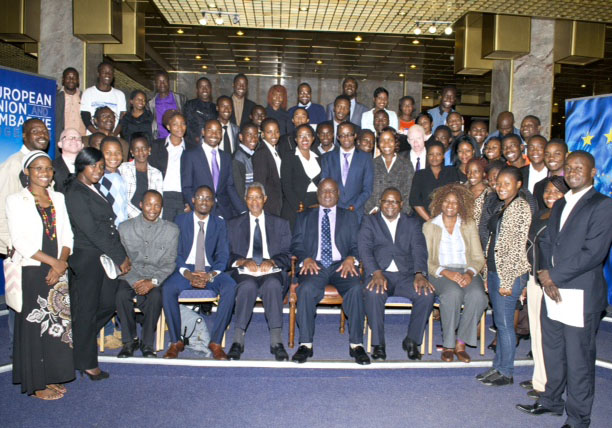
Jul 8, 2015 | News
The National Prosecuting Authority (NPA) of Zimbabwe convened its first strategic planning workshop with technical support from the ICJ, under recently launched European Union (EU) funded project to contribute to an improvement in administration of justice in Zimbabwe.
The strategic planning workshop took place in Harare from 6 to 8 July 2015.
The NPA is established under section 259 of the 2013 Constitution as a separate, independent and accountable institution responsible for instituting and undertaking criminal prosecutions on behalf of the State, promoting a just and fair system for all persons approaching the courts and protecting the rights of the arrested and detained persons as provided for by the Constitution.
The strategic plan will allow the NPA to set its vision, objectives and including stakeholders’ expectations as guided by the Constitution and the National Prosecuting Authority Act for the next 5 years.
The NPA held this strategic plan as its first ever strategic stakeholder’s engagement since its establishment under the Constitution in May 2013.
To validate and ground the strategic plan and outputs, the NPA invited civil society organizations, law based institutions, human rights advocates, women lawyers associations, legal aid institutions, the Parliament Thematic and Standing Committee representatives, law enforcement agencies, and law professors, among others.
The Judicial Service Commission and Law Society of Zimbabwe, ICJ’s partners in EU funded project on improvement in the administration of justice, also attended the NPA strategic planning session.
The strategic plan will inform further interventions and activities for strengthening the observance of the rule of law, fair trial and access to justice by the NPA with support from ICJ’s EU funded project.
Once developed and adopted, the strategic plan will further open opportunities for other technical partnerships and funding opportunities for the NPA.
Contact:
Arnold Tsunga, ICJ Regional Director for Africa, t: +27 73 131 8411, e: arnold.tsunga(a)icj.org

Jun 24, 2015 | News
The workshop took place from 22-24 June in Victoria Falls and had a special focus on children’s rights as a particularly vulnerable group.
Its primary objective was to create a pool of jurists and activists with the knowledge and ability to undertake strategic litigation before national or regional courts in the interest of victims of human rights abuse by business enterprises in the Southern/Eastern Africa region.
To this end the meeting brought together legal practitioners and Human Rights Defenders involved in human rights legal accountability of business enterprises.
This workshop gathered together a selected group of human rights advocates from Malawi, Zambia, Botswana, Zimbabwe, Uganda, Kenya and Tanzania working on cases relating to business’ human rights abuse.
In East and Southern African countries mining represents a significant part of the national economies and annual GDP.
Tanzania, Malawi, Zambia, South Africa, Botswana and Mozambique have seen the inflowing investments grow in recent years, but it is not clear that this trend has meant improvements in the realization of human rights, especially economic and social rights.
Child labour is endemic, and its occurrence in tobacco plantations subject children to additional hazards to their health and wellbeing.
Mining and oil exploration creates problems to local communities who are not properly consulted or benefit from the activity and usually bear the brunt of environmental degradation and pollution associated with those extractive industries.
Business enterprises are in many instances complicit with State’s violations of human rights.
The meeting also sought to provide legal and other tools to community representatives and litigators who want to start strategic litigation in the public interest.
This flows from the realisation that effective remedy and reparation for victims of business human rights abuses, especially in a transnational context, remains elusive as ever and confronts a series of legal and procedural obstacles.
Access to effective remedy and justice is a priority objective in the context of work relating to the human rights responsibilities of business enterprises.

May 15, 2015 | News
Today the ICJ is launching an EU funded project to contribute to an improvement in administration of justice in Zimbabwe.
It is hoped that it will also result in greater legal protection of human rights as enshrined in the new constitution of Zimbabwe and to meet Zimbabwe’s international legal obligations pursuant to UN and African Union treaties to which it is Party.
Some of the activities that will be carried out under this project include:
– Organising judicial symposia;
– Working towards the re-establishment of the Zimbabwe Judicial College;
– Organising training workshops for non-judicial court staff;
– Organising training for prosecutors, magistrates and lawyers;
– Working for the full implementation of international human rights and rule of law standards as they relate to the administration of justice, including the ACHPR Principles and Guidelines on the Right to a Fair Trial and UN Basic Principles on the Independence of the Judiciary and UN Basic Principles on the Role of Lawyers;
– Working with the Law Society of Zimbabwe to improve the professional integrity of legal practitioners; and
– Supporting the revision of Zimbabwe’s Court Rules.
Speeches:
Zimbabwe-Speech Com Chinhengo-Advocacy-2015-ENG (ICJ Commissioner Chinhengo)
Zimbabwe-Speech CJ GG Chidyausiku-Advocacy-2015-ENG (Chief Justice Chidyausiku)
Zimbabwe-Speech EU Ambassador-Advocacy-2015-ENG (EU Ambassador)

Apr 20, 2015 | News
The ICJ and the Zimbabwe Law Students Association (ZILSA) held a symposium on economic, social and cultural rights (ESC rights) on 17 April 2015 at Rainbow Towers Hotel, Harare.
A total of 84 people attended the symposium, 77 being students from the University of Zimbabwe.
The presenters at the symposium were Deputy Chief Justice L. Malaba, Dr V. Guni, Mr. D. Chimbga, Ms R. Rufu and Mr. J Mavedzenge.
Economic, social and cultural rights are a new phenomenon in Zimbabwe’s human rights discourse as they have been introduced into Zimbabwe’s Declaration of rights by the new Constitution of Zimbabwe (Constitution of Zimbabwe Amendment (No.20) Act 2013).
Zimbabwean jurisprudence on ESC rights is therefore still developing.
As a consequence, the notion of the justiciability of ESC rights is one that still requires nurturing if greater protection of these rights is to be achieved.
It was this background that motivated the ICJ and ZILSA to hold this symposium on ESC rights.
The symposium forms part of a broader initiative by the ICJ to ensure ESC rights awareness, education and litigation in Zimbabwe.
Through this symposium, the ICJ and ZILSA sought to provide a platform for law students to engage in an academic discussion on the scope, meaning and enforcement of the ESC rights.
The symposium discussions were meant to increase the students’ knowledge and understanding of ESC rights.
The topics presented at the symposium focused on the historical development and significance of ESC rights, litigation and justiciability of ESC rights under the new constitution and international best practices in the implementation of ESC rights.
The key note address was made by Deputy Chief Justice Malaba, under the topic, “Defining the Role of the Judiciary in the Enforcement of ESC Rights in Zimbabwe”.
The focus of his presentation was how the Zimbabwean judiciary has developed jurisprudence around ESC rights and in particular the approach of the Constitutional Court to the issue of “progressive realization” of ESC rights.
Commenting, after the symposium, Herbert Muromba a 4th year law student and President of ZILSA said: “The Deputy Chief Justice has transformed my understanding of ESC rights. The whole concept is no longer abstract but real, alive and relevant in my everyday life.”
Contact:
Arnold Tsunga, ICJ Regional Director for Africa, t: +27 73 131 8411, e: arnold.tsunga(a)icj.org
Mar 4, 2015
82. JAL 07/02/2014 Case no: ZWE 1/2014 State reply: 10/10/2014 Alleged acts of harassment against leaders of two associations promoting and defending human rights. Observations 83. The Special Rapporteur thanks the Government of Zimbabwe for the response submitted to...








